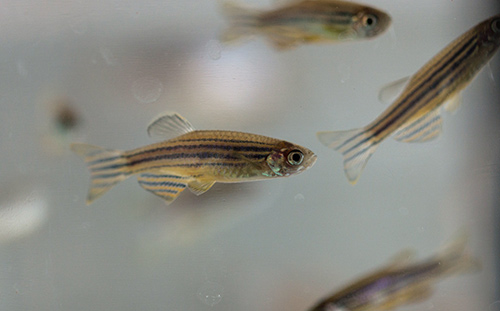Ethical review process
No research involving animals can be undertaken at Manchester until it has been refined and approved via a strict review process.

All our research involving animals is considered in a local Animal Welfare and Ethical Review Body (AWERB) or its sub-committee, which can require changes to a programme of work or a refusal to allow the work to be carried out as planned.
AWERB includes: six experienced senior scientists who are experts in different fields, three lay people (one of whom has no links to the University), a named veterinary surgeon (NVS), a named animal care and welfare officer (NACWO), the Named Training and Competency Officer (NTCO), and any other person the Chair might ask to provide advice.
The review process takes place as follows:
- We ask the scientist applying to perform research involving animals to complete a questionnaire and forward it, along with a draft of the project licence application, in advance of face-to-face discussions with the NVS, NACWO, a Named Training and Competency officer (NTCO) and an animal technologist. The project will not be considered unless it has been approved by the nominated expert in experimental design and statistics.
- At the meeting, each procedure will be discussed to ensure further refinement, reduction or replacement is explored. The principal investigator may be asked to explain and modify certain aspects of their application. The NVS and the NACWO provide comments, which are then sent to all members of the AWERB.
- Each project is subject to group discussion. At Manchester, we consider this to be superior to electronic review.
Our lay members regularly attend the RSPCA Lay Members’ Forum. You can read more about the role of lay members on the RSPCA website.
AWERB meeting minutes
- February 2016 (PDF document, 305KB)
- June 2016 (PDF document, 307KB)
- July 2016 (PDF document, 302KB)
- September 2016 (PDF document, 302KB)
- November 2016 (PDF document, 299KB)
- December 2016 (PDF document, 285KB)
- February 2017 (PDF document, 108KB)
- April 2017 (PDF document, 105KB)
- June 2017 (PDF document, 97KB)
- July 2017 (PDF document, 328KB)
- September 2017 (PDF document, 312KB)
- November 2017 (PDF document, 377KB)
- December 2017 (PDF document, 313KB)
- February 2018 (PDF document, 236KB)
- April 2018 (PDF document, 235KB)
- June 2018 (PDF document, 251KB)
- July 2018 (PDF document, 238KB)
- September 2018 (PDF document, 225KB)
- November 2018 (PDF document, 790KB)
- January 2019 (PDF document, 249KB)
- March 2019 (PDF document, 249KB)
- May 2019 (PDF document, 209KB)
- July 2019 (PDF document, 231KB)
- September 2019 (PDF document, 289KB)
- November 2019 (PDF document, 278KB)
- January 2020 (PDF document, 190KB)
- March 2020 (PDF document, 428KB)
- April 2020 (PDF document, 448KB)
- May 2020 (PDF document, 448KB)
- July 2020 (PDF document, 720KB)
- August 2020 (PDF document, 720KB)
- October 2020 (PDF document, 672KB)
- November 2020 (PDF document, 224KB)
- January 2021 (PDF document, 249KB)
- March 2021 (PDF document, 231KB)
- April 2021 (PDF document, 223KB)
- May 2021 (PDF document, 221KB)
- July 2021 (PDF document, 225KB)
- August 2021 (PDF document, 212KB)
- September 2021 (PDF document, 228KB)
- February 2022 (PDF document, 236kB)
- February 2022 (PDF document, 211KB)
- March 2022 (PDF document, 227KB)
- April 2022 (PDF document, 210KB)
- May 2022 (PDF document, 290KB)
- June 2022 (PDF document, 231KB)
- September 2022 (PDF document, 228KB)
- October 2022 (PDF document, 518KB)
- November 2022 (PDF document, 247KB)
- December 2022 (PDF document, 248KB)
- January 2023 (PDF document, 222KB)
- February 2023 (PDF document, 238KB)
- March 2023 (PDF document, 291KB)
- April 2023 (PDF document, 224KB)
- May 2023 (PDF document, 232KB)
- June 2023 (PDF document, 248KB)
- July 2023 (PDF document, 226KB)
- September 2023 (PDF, 244KB)
- October 2023 (PDF, 225KB)
- November 2023 (PDF, 227KB)
- December 2023 (PDF, 234KB)
25 January 2024 (PDF 204 KB)
22 February 2024 (PDF 213 KB)
21 March 2024 (212 KB)
25 April 2024 (217 KB)
23 May 2024 (204 KB)
20 June 2024 (210 KB)
25 July 2024 (212 KB)
19 September 2024 (223 KB)
17 October 2024 (647 KB)
14 November 2024 (521 KB)
12 December 2024 (273 KB)
30 January 2025 (262 KB)
27 February 2025 (290 KB)
27 March 2025 (248 KB)
24 April 2025 (246 KB)
29 May 2025 (257 KB)
3Rs AWERB subgroup meeting minutes
March 2021 (PDF document, 248KB)
June 2021 (PDF document, 827KB)
September 2021 (PDF document, 284KB)
December 2021 (PDF document, 281KB)
March 2022 (PDF document, 857KB)
June 2022 (PDF document, 193KB)
July 2022 (PDF document, 231KB)
September 2022 (PDF document, 186KB)
December 2022 (PDF document, 183KB)
March 2024 (495 KB)
June 2024 (173 KB)
Ethical review requirements for approval
Animal research falls into different categories, depending on exactly what is involved.
The approval process for each category is as follows:
- Category A research requires full ethical approval by the University's AWERB.
- Category B research (collaboration with other laboratories outside of the EU, or where animal facilities are being provided by third parties outside of the EU) requires ethical approval by the AWERB. The ethics committee will need to be satisfied that the welfare standards are consistent with UK and local legislation and that the principles set out in this policy are applied and maintained.
- Category C research requires appropriate and proportionate ethical review by the University.
- Category D research may require appropriate and proportionate ethical review.
New Committee for the Ethical Review of Category D Research
Even though the 1986 act does not require it, The University of Manchester has set up a subcommittee of AWERB to ethically review its category D research. Find more information here.
